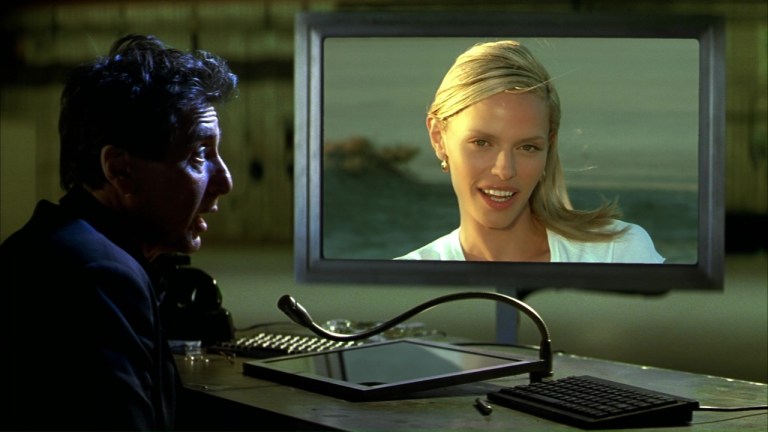This Al Pacino Movie Predicted Our AI Actor Future
A new tech innovation was already covered more then two decades ago in the movie S1M0NE.

Before Tilly Norwood, there was Simone.
In the latest attempt to legitimatize the technology, a startup called Particle6 has debuted Tilly Norwood, an AI-created actress. In videos posted to Instagram, Tilly boasts about her range as a performer and, according to Deadline, the gambit worked. Talent agencies have already made offers to represent Tilly in her film and television career.
Like most things that AI advocates call innovative, Tilly is derivative, a rehash of ideas from decades ago. Not only did the producers of the 2001 snooze-fest Final Fantasy: The Spirits Within already try to make a star of their digitized lead Aki Ross, but an AI actress was the subject of the 2002 movie Simone (or S1M0NE).
Written and directed by Andrew Niccol, S1M0NE stars Al Pacino as movie director Viktor Taransky. Frustrated by the way tantrums from flesh-and-blood performers like Nicola Anders (Winona Ryder) disrupt his vision and gifted cutting-edge technology by a disturbed, dying programmer (Elias Koteas), Taransky creates a digital actress called Simone (Rachel Roberts, credited as “Simone”). Now equipped with a performer he can control, Taransky fully realizes his masterpiece—a nondescript gothic picture called Sunrise Sunset—and Simone earns rave reviews. Yet, at the height of his success, Taransky begins to question the ethics and the ironic loss of control that comes from his abandonment of reality.
For a movie that’s so strident about creativity, S1M0NE, ironically, lacks creativity. The problem isn’t that Niccol draws inspiration from the myth of Pygmalion (a point underscored by an internet search from Taransky’s precocious daughter Lainey, played by Evan Rachel Wood), but rather many of the choices made to update the Greek tale. Niccol indulges in the digital tinting that came into vogue following The Matrix, O Brother Where Art Thou?, and Traffic, bathing scenes in blue and yellow for no real reason. The plot involving Lainey maneuvering to reunite Taransky with her mother/his ex-wife Elaine (Catherine Keener) feels right out of The Parent Trap. There’s even a direct rip of Naomi Watts’s audition scene from Mulholland Drive.
Such problems aren’t unusual to Niccol’s films. While he often has compelling concepts, Niccol sometimes struggles to turn those ideas into compelling drama. His most successful outings benefit from a collaborator who helps bring them to life, whether it’s a strong cast in 1997’s Gattaca or direction from Peter Weir in 1998’s The Truman Show.
Yet, for all its shortcomings, S1M0NE does uncover a truth about AI that modern tech magnates too often forget: tech to replace human beings will eventually replace its creator too. As her star ascends, Taransky becomes increasingly irrelevant. He can’t even discredit her by
programming her to say horrible things on a chat show (she advocates children carrying firearms to school for protection and closing America’s borders to immigrants, statements that were controversial in 2002 and are now positions held by many who also like the idea of AI). And when Taransky finally pulls the plug on his creation, he’s charged with murder.
Beyond the rewriting of the tragedy implicit in all stories about innovation, from Pygmalion to Frankenstein, S1M0NE underscores the fact that the human element can never be completely removed, no matter how good the tech. Taransky creates Simone by amalgamating qualities from past movie stars such as Audrey Hepburn and Sophia Loren. In the aforementioned Mulholland Drive riff, Tarkovosky notices a wrinkle in Nicola’s face, a quality he would have never thought to add to his performer.
Although uneven as a film, S1M0NE offers a reminder that so many forget, especially those in the tech world. We create art to experience humanity. When you remove the humans, the art dies too.
